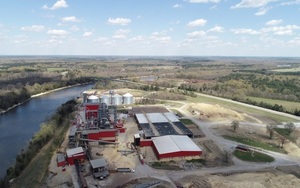
Drax Group plc on July 27 announced its pellet plants produced approximately 1.9 million metric tons of wood pellets during the first half of 2023, down slightly when compared to the 2 million metric tons of production reported for the same period of 2022. The company discussed its pellet operations in its second quarter financial report.
Drax attributed the reduced production to several factors, including forced outages and the temporary suspension of production at its Entwistle plant in Alberta due to the facility’s proximity to wildfires in Canada. These factors were partially offset by production at the pellet plant in Demopolis
Alabama.
Drax also noted that the loading systems at the Port of Baton Rouge were damaged by high winds in June, requiring the use of back-up systems and logistics, increasing costs and restricting the speed of operations. Repairs are currently underway, according to the company.
Disruptions due to wildfires are continuing into the second half of the year. Drax said that operations at its Burns Lake, Smithers and Houston facilities in British Columbia were temporarily suspended in July due to their proximity to wildfires. In addition, the company said industrial action by longshoremen continues to disrupt the Ports of Vancouver and Prince Rupert in British Columbia, which is impacting Drax’s operations.
The company’s North American pellet business reported adjusted EBITDA of £48 million during the first half of the year, up slightly from £45 million during the same period of 2022. Drax said results are impacted by continued incrementally higher costs associated with in-country transportation and energy costs. Labor costs and fiber prices have also increased. According to the company, the impact of these costs has been balanced by an increase in revenues. “We remain focused on opportunities to reduce the cost of biomass, but will balance this against the need to optimize our supply chain to deliver value for the group,” Drax said in a statement.
Drax in December 2022 made a final investment decision (FID) to develop two new pellet facilities. On the West Coast of the U.S., Drax plans to develop a 450,000-ton-per-year new-build pellet plant in Longview, Washington, along with a new port facility at the location. On the East Coast, Drax plans to develop a 130,000-metric-ton-per-year expansion of its existing Aliceville facility in Alabama. The combined investment in the two projects is estimated at $300 million. Both projects are expected to be operational by 2025.
With the new projects, Drax will have 18 wood pellet plants with a combined capacity of approximately 5.4 million metric tons per year.
Drax also said it continues to target opportunities to sell biomass to third parties, and in July agreed to supply a Japanese customer with approximately 450,000 metric tons of wood pellets over a five-year period. Deliveries are expected to start late this year.
Drax also addressed bioenergy with carbon capture and storage (BECCS) projects in its finical report. "We continue to focus on our role as the U.K.'s leading generator of flexible renewable power and our ambition to be a world leader in carbon removals,” said Will Gardiner, CEO of Drax Group. “To that end, in the US, we have made good progress screening options for BECCS projects which can deliver long-term, large-scale carbon removal and attractive opportunities for growth.
"We are excited about the opportunity for BECCS in the U.K. and are in formal discussions with the U.K. government to facilitate the transition to BECCS at Drax Power Station by 2030,” Gardiner continued. “Our plans could create thousands of new jobs in the Humber region, help the UK meet its carbon removals targets and support long-term energy security."
Over the past two year, Drax said it has been progressing a number of work streams to develop options for BECCS, with a primary focus on North America. This includes the development of plans for a new-build BECCS power unit that would have the pact to produce 2 terawatt hours (TWh) per year of renewable electricity from biomass and capturing approximately 3 million metric tons per year of carbon dioxide. According to Drax, two initial sites in the U.S. have been selected. Together, those sites could capture 6 million metric tons per year of carbon dioxide by 2030.
“The design of new-build BECCS enables a wider choice of biomass materials, including non-pelletized material, such as woodchips,” Drax said in its financial report. “Drax aims to locate new plants in regions which are closer to sources of sustainable biomass and carbon transportation and storage systems. This is expected to significantly reduce the operating cost of a new-build BECCS plant compared to a retrofit, as well as reducing carbon emissions in the supply chain. However, we may need to source from further afield to ensure consistent access to the volumes of fiber required.”
Drax also said it is continuing to evaluate additional sites in North America and aims to create a pipeline of development opportunities. In addition, the company is also assessing options to add carbon capture to an existing pellet plant in Louisiana and develop BECCS projects using existing non-Drax assets.
A full copy of Drax’s half year financial report is available on the company’s website.